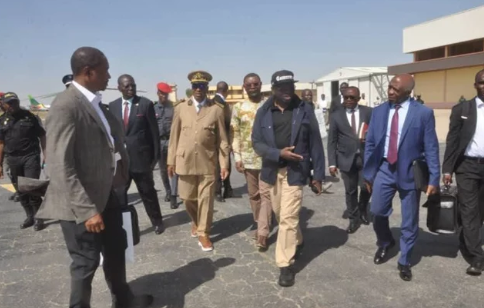Yaounde, Cameroon – For over four decades, Cameroon has been a nation held together by authoritarian control, political repression, and a fragile ethnic balance. Today, however, all signs point to an imminent implosion. What began in 2016 as a push for self-determination by the former British Southern Cameroons, now Ambazonia, has spiraled into a full-blown conflict. The economy is in free fall, the social contract between the state and its citizens has been completely eroded, and the delicate ethnic equilibrium is breaking apart. As Paul Biya, Cameroon’s 91-year-old dictator, teeters between life and death, multiple power blocs—both within and outside his government—are positioning themselves for a potentially catastrophic showdown.
The first and most pressing fault line in Cameroon’s disintegration is the ongoing war for Ambazonian independence. When Biya declared war on independentists in 2017, he believed his military would quickly crush resistance. Eight years and counting, Ambazonian forces remain undefeated. The war has not only drained the government’s already stretched financial resources, but it has also severely weakened the military, rendering it incapable of sustaining order across the entire country. Cameroon’s inability to contain Ambazonian-fighters while simultaneously failing to meet its military’s logistical needs has emboldened other factions within the country.
The result? Today, Ambazonia is effectively standing. The government in Yaoundé has lost control over much of Ambazonia and despite ongoing propaganda, it is clear that the conflict is unwinnable. While Ambazonian forces continue their fight for full international recognition, the government in Yaoundé is crumbling under its own weight.
Cameroon’s economy has tanked under Biya’s rule, exacerbated by a combination of war spending, corruption, and global economic instability. Inflation is at a record high, unemployment is soaring, and the government is struggling to pay civil servants. In the past few months, there have been multiple strikes by teachers, healthcare workers, and even the military over unpaid salaries. The public sector, once the bedrock of the government’s patronage system, is now in revolt.
In major cities such as Douala and Yaoundé, anti-government sentiment is at an all-time high. There are reports of increasing incidents of civil unrest, protests, and organized strikes, as citizens struggle under economic hardship. Many believe it is only a matter of time before these tensions erupt into an all-out revolution.
Cameroon’s fragile ethnic balance is collapsing. For decades, Biya’s regime has favored the Beti-Bulu ethnic group, creating deep-seated resentment among the Basas, Bamilikés, and the Grand North. With Biya’s health declining and speculation that he may attempt to transfer power to his son, Franck Biya, ethnic factions are preparing for a fierce succession battle.
The Bamilikés and Basas believe this is their opportunity to seize power, citing decades of electoral fraud that have kept them out of leadership. Meanwhile, in the Grand North, there is growing sentiment that power must return to them, considering their dominance under Cameroon’s first president, Ahmadu Ahidjo. The imprisonment of key northern figures like Hamadou Yaya and Iya Mohammed has only fueled this resistance.
Recent incidents confirm the rising tensions. Just a few days ago, the Secretary General of the Presidency, Ferdinand Ngoh Ngoh, and Territorial Administration Minister, Paul Atanga Nji, were ambushed in the Grand North, with their helicopter grounded by an angry population. This came just weeks after a regional governor was beaten by a mob. In a desperate attempt to control the narrative, the government’s Communication Minister, Rene Sadi, claimed that an intercepted large arms cache was meant for international trafficking rather than local insurgency. However, few believe this cover-up. The reality is that multiple factions within Cameroon are arming themselves for an inevitable confrontation.
Biya’s government is on borrowed time. If the regime attempts to orchestrate a power transition to Franck Biya, Cameroon could descend into a multi-front civil war. The Ambazonians are already out, and soon, other regions may follow suit. The army is overstretched, corrupt, and incapable of handling internal uprisings, making a successful transition nearly impossible.
Perhaps what makes the situation more dreadful is the fact that the Biya regime’s long-standing dependence on France is waning. With French influence shrinking in Africa following major losses in Mali, Burkina Faso, and Niger, Biya can no longer count on Paris to prop up his failing government. The international community, particularly the United States, since the first coming of Trump has grown increasingly vocal about Cameroon’s human rights abuses, isolating Biya on the global stage.
The signs are clear: Cameroon is imploding. From the North to the South, from the West to the East, there is growing consensus that the status quo is unsustainable. While Biya’s government clings to power, the forces of change are gathering momentum.
The only question that remains is: will Cameroon collapse into a violent, multi-front civil war, or will its people force a new political order before the inevitable implosion? Either way, the days of Paul Biya’s regime are numbered.

